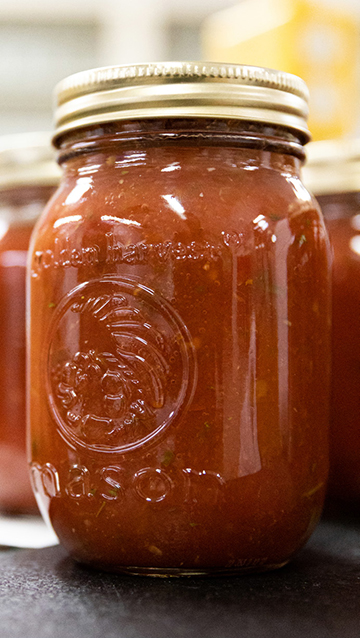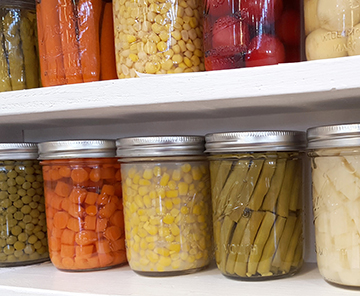
Home Canning for Family vs. Home Canning for Sale

“Your salsa is so great – you should sell it!” Have you ever heard these words about any of the canned foods that you preserve? Home canning is a great way to preserve the harvest and for your family and friends to enjoy high-quality local foods year-round.
When canning foods for your family, it is very important to use safe, tested recipes and methods to ensure that your family and friends who are consuming that food are getting the safest product possible. However, there are no governmental regulations on food that is prepared and consumed in your own home.
Unfortunately, there have been foodborne illnesses and even deaths from consuming improperly canned home-preserved foods. Accordingly, there are regulations in place to ensure that any canned foods that are sold are as safe as possible to reduce the likelihood of those foods making people sick. When selling foods, the producer must ensure that the food is as safe as possible to protect the reputation of the producer and reduce their liability, as well as to meet regulatory and marketplace requirements.
Although regulations in every state in the US are based on the same federal regulations from the US Food and Drug Administration (FDA) or the US Department of Agriculture (USDA) for meat and poultry products, the regulations for selling canned foods in every state can vary. Accordingly, if you want to sell canned foods, you need to check on the regulations in that state. The University Extension service in your state (a listing of resources on this topic in each state is available from: nchfp.uga.edu/business/starting_business.html) is a good place to start. Some states will allow sales of some home-canned foods such as fruit jams and jellies at farmers’ markets or through other direct-to-consumer channels such as farm stands, but other states may not. In some states, there may also be different local-level regulations. In general, selling canned foods to another business such as a grocery store will require that the product is inspected, which means that it cannot be canned in a regular home kitchen, but will instead need to be made in a commercial kitchen under a license.
In summary, the regulations for selling canned foods can vary in every state, so it is important to check the regulations in your state for guidance. The North Central Region Food Safety Modernization Act Center has some regional fact sheets available on the regulations for selling various canned foods at: ncrfsma.org/resources. Additional resources for selling preserved foods are available from: nchfp.uga.edu/business/starting_business.html.
Canning for Variety in Meal Planning

When canning food at home, take time to plan how you want to use that food in meal planning. Is it better to keep it simple and can one food by itself, such as carrots, potatoes or tomatoes? Or, for example, would you rather have seasoned tomatoes or mixtures of vegetables ready to use?
In many ways, having jars of a single food allows more versatility in how they can be used as an ingredient in a recipe. For example, a jar of plain tomatoes could be used in recipes such as stew, soup, chili, salsa or casseroles.
As an alternative, canning food combinations, such as a vegetable soup mix can make a quick meal in just minutes. A ready-made salsa makes a tasty snack for visitors who drop in for a visit. A spaghetti sauce with meat makes an easy meal by just heating it up, cooking some pasta, and the main dish is ready to go.
Just remember when planning what you want to can, use trustworthy resources and recipes to help you can foods safely. A great place to start is the North Central Region Food Safety Extension Network at ncrfsma.org/north-central-food-safety-extension-network-ncfsen or the National Center for Home Food Preservation at nchfp.uga.edu.
Want to can mixed vegetables? See this recipe from the National Center for Home Food Preservation at nchfp.uga.edu/how/can_04/mixed_vegetables.html.